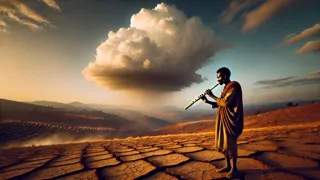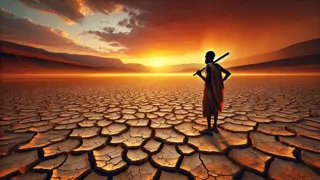Introduction
Beneath the scorching sky of an Ethiopian highland, where cracked earth bled dusty pattens across the valley floor and the sun’s unrelenting glare silenced every whisper of hope, the villagers gathered at the brink of despair. They spoke in hushed tones of once-green terraces now barren, of wells run dry and livestock fallen to the merciless thirst. An age-old promise of rain—woven into their customs by ancestors who danced beneath cloudbursts—seemed lost to the relentless drought. Yet among their forlorn ranks stood a solitary figure whose slender frame and gentle countenance spoke of a quiet resolve. He bore a hump upon his back as if nature itself had carved into his spine a constant reminder of life’s burdens. In his hand he cradled a flute, fashioned from a single bamboo stalk, etched with ancient symbols of wind and water. This instrument had been his companion through every sunrise and sleepless night.
From the moment he first lifted its mouthpiece to parted lips, the flutist had mesmerized his friends and family with melodies that fluttered like swallows at dawn. But songs alone could not coax a single drop of moisture from the hardened soil. Day after relentless day, he ventured along the ragged paths that wound through the sun-charred hills, playing for lonesome herders, forgotten springs, and neglected altars at broken shrines. Even his music, soft as summer rain, was met by an unyielding silence. Villagers watched with wary eyes, some mocking his humble stature and crooked back, convinced that no melody, however pure, could outmatch the sun’s fury and the wrath of an unseen sky.
Still, the flute-player persisted. Each note he breathed into the wind carried a prayer for mercy, each trill a plea for renewal. When children held out parched gourds seeking even a drop of dew, he closed his eyes and imagined rivers flowing through thirsty ravines. When elders recounted long-vanished rains that once fed a thousand fields, he drew strength from memory and placed it into every song. Little did the doubters know that the flute’s magic—awakening only to those who believed in the unseen—would soon be tested by mysteries beyond mortal reckoning. For the hush that cloaked the valley was not merely the absence of moisture, but a silence woven by forces that asked an even greater price for their revival. In the hush, destiny beckoned, and the humpbacked musician prepared to follow one final melody to the very heart of the sky.
Whispers Beneath Parched Skies
Each dawn the flute-player awoke to a chorus of brittle sighs—a wind sweeping empty fields, dust swirling like broken birds in flight. He stepped out from his modest hut of woven grass and sun-bleached wood, his flute strapped across his back, its carved symbols worn to a soft patina by countless caresses. The villagers greeted him with polite nods, though their eyes traced his hump, the narrow ridge that curved along his spine like a silent question. In those eyes, he often saw pity, but sometimes he glimpsed a glimmer of hope—an unspoken wish that his music might yet soften the sky.

He wandered the narrow paths that wound through the terraced slopes of teff and barley, long since withered into gray stubble. Each step echoed with memories of harvests that had fed a hundred families; now only regrets and empty baskets awaited beneath a sun too harsh to show mercy. The flute-player paused at each ruined furrow, drew his breath slowly, and lifted the bamboo instrument to his lips. From its hollow body spilled a melody—a low, steady hum, like the earth’s own heartbeat, rising in gentle swells and sighing with the softness of distant rainfall.
Sounds clung to the air, weaving through the stalks of withered grain and drifting across the goat pens where bedraggled animals huddled for shade. Even the wind seemed to hush as if leaning closer to catch every note. But the sky remained a blank canvas of merciless blue. The melody ended and the flute-player exhaled, heart brimming with longing. He offered a silent apology to the fields, a promise to return and try anew.
Word of his practice spread to the elders of the village council, who convened beneath an acacia tree bleached by the sun. Some called him a fool, wasting precious time on a song that could not summon one drop of rain. Others, remembering the old tales of silver clouds summoned by wind and song, urged him to continue. No one dared propose what they whispered beneath closed palms—the desperate idea that perhaps he might fail them all.
Soon the flute-player’s daily ritual became a spark of hope in a land growing numb to miracles. Children followed at a careful distance, imitating the gentle curve of his fingers along the bamboo’s finger-holes. They hummed his melodies while sweeping dust from empty courtyards, their laughter hollow but endearing. Women, burdened by water skins too light to quench thirst, paused at their chores to close their eyes and listen. In every corner of the withered valley, the hum of expectation stirred.
Yet it was after dusk, when the world softened under a violet sky, that the musician found his greatest solace. Beneath a cluster of lantern-lit huts, villagers gathered on rugs and woven mats. He sat cross-legged, flute in hand, as the first notes drifted into the fragrant evening air—notes that spoke of longing beyond words. Moths and fireflies danced at the fringes of light, weaving luminous trails among the hymn of crickets. Even the moon—pale and weary—seemed to listen as ripples of music rose and fell like a gentle tide.
On one such night, an old woman approached him with eyes that held lifetimes of grief. Her skin was lined by decades of sun and sorrow; her hands trembled as she placed a small wooden bowl before him. Inside lay a handful of bright seeds—ancient grains once sown in times of plenty. "Take these," she whispered. "Plant them when the rains return." The flute-player bowed his head. He felt the promise of change, though no drop had yet fallen. He carried the seeds to his hut, tucking them beside his precious flute.
Morning arrived crisp with expectation, but the sky remained silent. Undeterred, he went on playing—each day each evening—invoking memories of rivers that once ran like silver threads through the valley. On the seventh dawn, when he raised the flute to his lips, a pebble of cloud drifted across the horizon. He faltered, heart pounding at the sight of pale gray fringe edging the sky. The melody wavered as he coaxed the clouds closer, his notes trembling like a dawn breeze.
Conclusion
At the height of dusk, when the flute-player’s final notes faded into eager silence, the heavens trembled. From the east, great rolling clouds unfurled like ancient banners, their thunderous breath trembling over the hills. First a scatter of raindrops kissed the thirsty soil, then a deluge that washed away years of despair in a single exultant storm. Villagers emerged, arms uplifted, faces shining with tears, laughter, and song. Children danced in the muddy ruts, farmers knelt to scoop cold water to their parched lips, and elders whispered blessings to the music that had beckoned the sky.
The once-derelict fields, still slick with mud, quivered beneath the rhythm of new life. The flute-player, chest heaving with wonder, stood among his people as they sowed the gifted seeds. In time, emerald shoots would pierce the softened ground, and the valley would hum once more with the promise of abundance. Yet the true miracle lay not in grains or grain-filled barns, but in a simple flute and a steadfast heart that refused to yield to silence.
Generations later, when harvest festivals painted the highland villages with laughter and song, the tale of the humped musician endured. He became legend, his hump a symbol of burdens carried and triumphs earned, his flute the voice of compassion that turned drought into blessing. And whenever dark clouds gathered on the horizon, elders whispered his melody once more—reminding young and old that hope, like music, can shape the world.
















